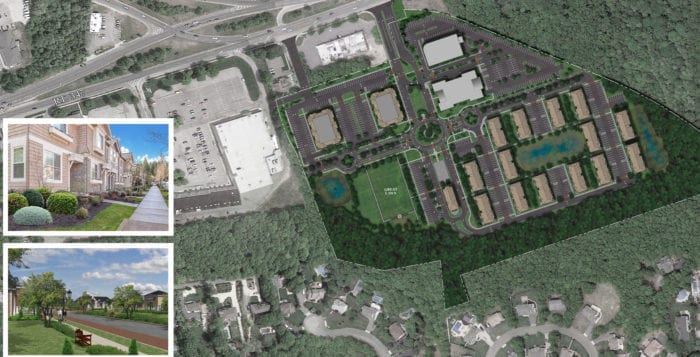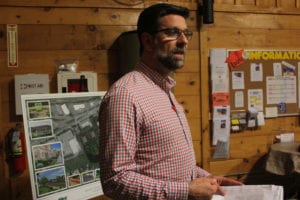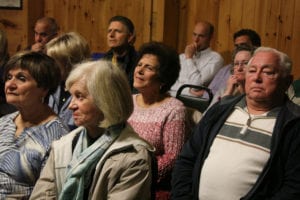A Mount Sinai millennial housing project, located on Route 25A near Myrtle Street, dubbed Mount Sinai Meadows inches closer to breaking ground on construction.
On July 19, Woodmere-based real estate developer Basser-Kaufman was approved of a change of zoning from J-Business 2 to Planned Development District. The application is currently being reviewed by the Town of Brookhaven Planning Board.
Lori Murphy, legislative aide for Councilwoman Jane Bonner (R-Rocky Point) said the application is currently being looked at by the Planning Board and will have to be reviewed by multiple departments including the Highway Department.
Asked if she knew how long the Planning Board would take to review the application, Murphy said it varies from a case by case basis and could only confirm that the zone change was approved by the town.
Site plans for the project call for 140 housing units, including 106 two-bedroom apartments and 34 one-bedroom apartments. The complex will have bike racks, walkable grounds, communal barbecue areas, electric car charging stations, a large open lawn for the use of residents and four spaces toward the northern end of the property that will be used for large retail spaces, according to a March 2019 TBR News Media article. There will be 21.78 acres used for residential housing, while 8.3 acres will be retail.
The mixed-use complex will be geared toward creating a living space for young adults and young professionals. According to the developers, they are catering toward the 20-34 age group.
Ann Becker, president of the Mount Sinai Civic Association, reiterated that the civic supports the development and are awaiting to hear updates from the town once it goes through planning.
“We want something for young people and professionals,” she said. “We were looking for flexible options for available housing for young people, the developer has assured us at this point that the number of children won’t burden the community.”
She brought up another point that approximately 20 percent of the housing stock in the hamlet is for those 55 and older. Becker said they didn’t want an overload of senior living facilities in the area.
Construction is currently underway for two projects, a 120-unit Bristal assisted living community and a 225-unit senior rental complex for individuals 55 and over at the corner of Echo Avenue and Route 25A.
Becker said while some children could come out from the development, she said she believes it could aid the declining school enrollment in the Mount Sinai School District.
Marc Kemp, a representative at Bassar-Kaufman, said once they can get site plan approval from the planning board they will move forward with the development.
“It [the review] could take eight to 10 months,” Kemp said. “Once we get the approval we want to break ground as soon as possible.”









